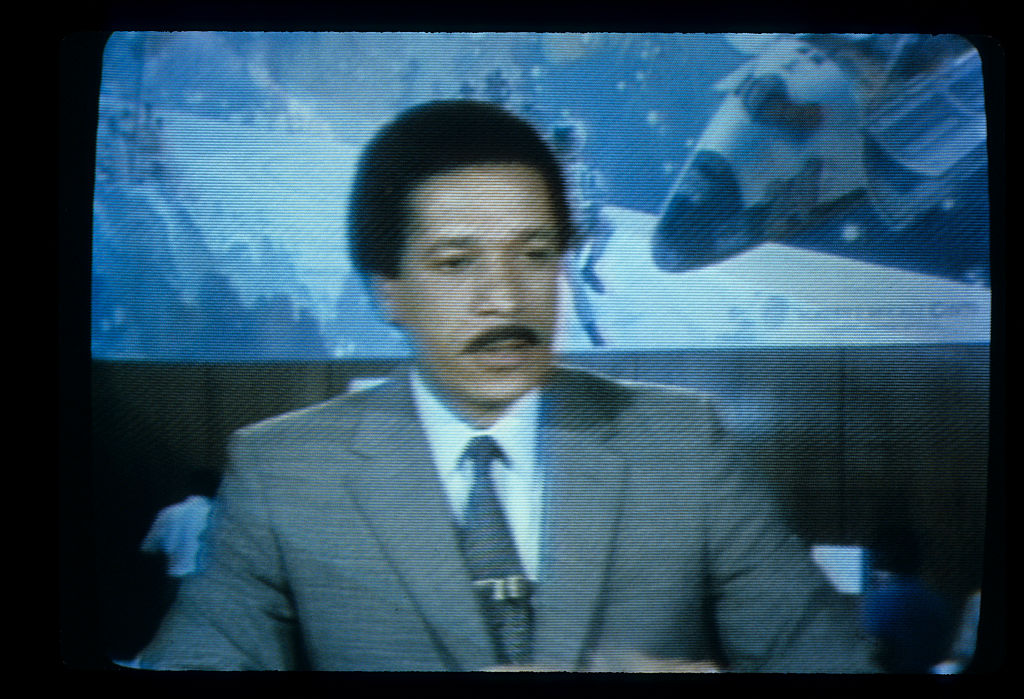The Historic Career Of Max Robinson: The First Black News Anchor
Source: Walt Disney Television Photo Archives / Getty
Pioneering journalist Max Robinson made history in the late 1970s after he became the first Black news anchor to co-host ABC World News Tonight alongside Frank Reynolds and Peter Jennings. Donning dapper three-piece suits, a kept afro, and a rich voice, Robinson captivated viewers at home with his charming demeanor and brave views on racism and equality following the civil rights movement.
“It was a breakthrough,” said Clarence Page, a columnist at the Chicago Tribune who worked alongside Robinson to write his autobiography, according to the New York Times. “Max helped open the door for a lot of other journalists.”
When Robinson took on the historic role, he came with a well-polished resume too, priming his journalism chops at stations in Washington D.C. and Virginia. It took an abounding sense of self-confidence to climb up the ranks as a Black man in a predominately white industry at the time, but the determined news anchor overcame every obstacle set in his path.
A small-town boy with a big dream
The Richmond Virginia native was born in 1939. He was the second of four children. According to the New York Times, his father Maxie was a teacher and a sports coach who was well respected in the community. Robinson and his siblings grew up during the height of segregation.
“When we’d board buses, we had to walk to the back of the bus,” said his younger brother Randall. “To buy Chinese food we had to go to the back door.”
Robinson attended Oberlin College but he didn’t graduate. Still, the broadcast icon had the pride and confidence he needed to pursue his dreams in the broadcast world all thanks to his parents, who constantly showered him and his siblings with praise and “a sense of cultural pride,” according to Page.
“Max wasn’t going to change who he was,” he added.
The determined journalist landed his first news job in 1959 at a station in Portsmouth, Virginia, although he was not allowed to show his face on camera. A large screen barrier was placed up to conceal his identity as he read the news, He was later fired when he asked for the screen barrier to be taken down so that viewers at home could see him. Years later in 1966, Robinson made a guest appearance on “Meet The Press.”
“I remember seeing his head and thinking: ‘Oh, my God. Max is on national television,’” Randall Robinson recalled of the big moment. “We lit up the family telephone circuit.”
Success seemed to skyrocket for the star because, after three years of hard work and determination, Robinson became the first African American co-anchor at WTOP in Washington, where he soared with station ratings and garnered support from a ton of fans. The broadcast icon became one of the founding members of the National Association of Black Journalists and regularly mentored other young Black reporters looking to follow in his footsteps.
Robinson spoke out against racism in the Black community
Robinson’s on-air talent began to cause quite a stir across the nation. So much so, that ABC executives caught wind of the anchor. It was a matter of time before they offered him a position at World News Tonight to co-host with Frank Reynolds and Peter Jennings. He was a perfect choice, too. With his friendly disposition and unapologetic views on Blackness in America, Robinson gave a voice to the Black community, often challenging racism and giving his unfiltered view on the issues impacting Black people across American society, even if he ruffled a few feathers.
“Max challenged his own network at the time,” world-renowned journalist Art Franklin told CBS 42 of his admiration for the anchor, noting how Robinson would call out the racism he would see at the news station.
“He said ABC would take black journalists and journalists of color and put them in faraway places. But then when the big story came there, they pulled them out and put white journalists in their place.”
Franklin said he was enamored by Robinson’s unwavering commitment to uplifting Black Americans through media.
“There was somebody who was truly fighting for people who look like me, and he was doing it at the highest level,” Franklin said. “I knew if I did what he did, I could be impactful in my community – to tell stories about us, by us with the context was necessary that can only come from people who had lived that life.”
Sometimes, the steadfast journalist’s unapologetic bravado was met with opposition. Executives would often criticize him for his views and even his attire at times, but during his tenure at ABC from 1978 to 1983, Robinson held his own, showing up to the station in exotic furs and expensive clothing just to prove a point to those who didn’t believe in him, at times, even his own colleagues.
Barbara Matusow, the author of “The Evening Stars,” which dives deep into the behind-the-scenes work of network news, claimed that Robinson “felt like a victim of racism” at times.
“He had his ideas and they didn’t take to them. Instead, it was, ‘Here, read your copy.’” She added, “I think it was a shock to go to a network that looked down on you. ”
In 1983, Robinson left ABC after Jennings was promoted to take over World News Tonight as the sole anchor. He landed a job at a TV station in Chicago but retired two years later in 1985.
SEE ALSO:
Oakland’s Finest: The Meteoric Rise Of Malika Andrews
What Happened To Wendy Williams? Why The TV Icon Deserves Her Flowers Now

